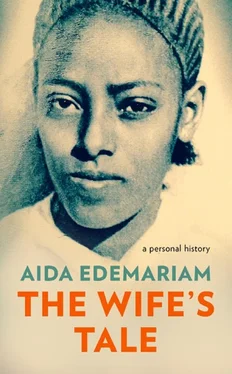Gondar dropped out of sight.
The town had emptied of people as abruptly as it had filled, and for a few weeks had felt quiet but stretched out of shape, waiting, but uncertain what it was waiting for.
And then one day an answer: six specks in the sky, specks moving faster and straighter than any bird, growing bigger and bigger, until she could hear them roar.
Oh mother of God, what is this? Snatching up her daughter, the baby, looking frantic about for somewhere to hide. Oh daughter of David, save us.
Closer and closer the specks came. They looked like crosses now, stubby dark crosses, trailing smoke. The streets ran with women, children, clergy, the infirm – anyone able-bodied had marched away with Ras Kassa or quietly disappeared. As the thundering drew near they threw themselves into ditches, huddled against walls, behind trees. Oh Queen of Heaven, save us.
Around again. She didn’t see but was soon told how on the second pass, over the castles, a dark rain fell from them, a hail of metal that exploded with a terrible noise as it hit the ground. How many huts caught fire, and the women and children inside them.
That was when the order came from the emperor, who when the Italians invaded, marching over the border and finally taking Adwa, had headquartered at Dessié: evacuate Gondar during daylight hours, every day.
So here they were, travelling away from Gondar, as they had travelled yesterday, as they would travel tomorrow, and the day after that. They had crested a long rise and were looking down toward the Shinta river. Vegetable plots had been planted along its banks, and neat rows of silver-green kale rose up the slopes. They picked their way down to the water and dismounted under a stand of bayberry trees. The mules’ necks shivered, and their tails swished at the heavy flies. Most of the river had shrunk to mud, but a small stream still trickled through the main channel. Green algae waved around rocks like hair in a breeze. White and yellow butterflies flicked above the water; the mules’ muzzles dipped down, then away again, disdainful. Distant children called to cattle.
When the mules were rested they began to climb again, into rich farmland in harvest time. Everywhere pale gold domes of teff waited to be threshed, peas and beans hung heavy on vines, plots of glossy green chillis, of kale and tomato, bustled in toward each other. Men trotted past, staffs supporting on their heads piles of straw nearly as high as themselves. The ground grew steeper and rockier as the riverbed fell away. The mules’ mouths dripped.
A circle of dark trees crowned the hill, and within the circle stood a low church. Tethering the mules outside in the shade, they stepped under the acacia guarding the entrance. It was cool and calm inside the perimeter walls, under junipers and olive trees so old they towered above the church’s thatched roof. Dry leaves cracked underfoot, turtledoves cooed, bees buzzed around a hive. She bowed, made the sign of the cross. Made her way forward and bowed again, so her forehead touched the walls of the church, then her lips, forehead, lips.
Gonderoch Mariam, which her husband had led for eight years now, was old, far older than many churches in Gondar. Thirteenth-century, said the more historically inclined priests. Originally named Debrè-Genet, or Mount of Paradise, by the king who built it, it had long since been rechristened Gonderoch because so many people from Gondar were moved to walk up the mountain, to pray under its kind trees. Often when she and Tsega came here the younger deacons and priests would drop to the ground, making to kiss her husband’s feet. He would bend before they could do so, cupping their faces, raising them up, presenting his cross instead.
As they left the church compound she looked across the valley, back toward Gondar. The Italian aeroplanes had not merely terrified her, and her children and her neighbours; they had underscored, emphatically, that while churches, and especially churches at this height, had been always places of safety, they were safe no longer. She thought of their nearly two-hour-long treks back to Gondar in the evenings. Their occasional sightings of hyena droppings. The night she and the children had watched her husband climb up and shove his old rifle deep into the thatch. The day the dark dots had appeared again. She had never felt such fear, fear that was a kind of pure pain, which tightened her chest and loosened her bowels so she had to run behind a tree to empty them. For endless minutes they hardly breathed, waiting for the explosions. But they did not come, and the plane continued on its way.
Sometimes they did not go back down the mountain but stayed overnight with a patron of her husband’s, who owned land all around the church and had settled some on him. They could see it from her doorway: seven terraces divided by low stone walls dropping in wide steps down from the house, which was on the north-eastern brow of the mountain. Barley grew here. From the bottom of the terrace stretched the flat summit, shared with other landowners and planted with teff. Past the church, down the rocky slopes toward the Shinta, was more barley, of which they also received a share. Beyond the fields she could see the river valley, and Gondar, and then, in the hazed distance, the mountains that surrounded Gondar.
The dry season wore on. The farmers brought their tithes down the mountain. Wild figs darkened in the trees. The peaches mellowed, the potatoes and tomatoes, the gourds and chickpeas and peas ripened and were harvested. In the hollows jasmine bloomed. The caravans rattled through the markets, rushing before the rains. And with them came news. Ras Kassa had engaged the Italians at Tembien, in the mountains between Gondar and eastern Eritrea, but had been unable to push them back. Two months later he had been forced out of those peaks altogether. There were whispers about sheets of rain falling from aeroplanes, rain that stripped and burned and blinded, that dripped from the bushes and poisoned the lakes, that sent even the very bravest fleeing. The emperor gathering around him a vast and growing army.
We must join him, said her husband. I will not fight, being a priest, but I can minister to the soldiers. You will come with me. You will not blow trumpets or clean rifles or sharpen swords, as the wives of soldiers do, but like them you will bring your servants, and cook food. Gather provisions and prepare the household.
She bowed, yes, and did as she was told, struggling to seem calm despite her fear. But the days passed, and they did not leave. She watched as priests came and went, served them as they talked, listened and watched, and eventually gathered that many did not agree with him. He was their leader, they argued. Surely he should stay, to protect them?
And so they were still at Gonderoch Mariam when the Italians entered Gondar. Dejazmatch Ayalew Birru, Ras Kassa’s son-in-law, had declined to engage in guerrilla tactics that might have stalled them, and the foreigners had simply walked in, hundreds and hundreds of them, following vehicle after vehicle.
The small rains began. The giddying smell of fresh-wetted earth rose from the fields and, despite everything, ploughing had to begin.
The news grew worse and worse.
The emperor was defeated. Routed. Listening aghast they could almost see the terrible disordered retreat, the mountain passes jammed with fleeing men and women. Imagined the aeroplanes chugging through the air above, the fire they dealt, the terrible unnatural rain. The vultures circling across the day and the hyenas laughing through the night.
And then, at first almost incomprehensible – because wasn’t that one of the most fundamental expectations of a leader, that he should stay with his people, and die on the battlefield if need be? – the knowledge that Emperor Hailè Selassie had fled. He had taken his family and boarded a train to Djibouti. Ras Kassa and his youngest son had left for Europe too. Three days later, Italian columns entered Addis.
Читать дальше












